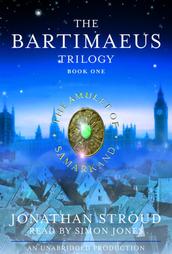The Amulet of Samarkand
Jonathan Stroud’s trilogy concerns a world not so unlike ours yet besides the normal day life there is another not so hidden world where magic is well and alive. Sounds so much like Harry Potter, yes it does. It too is about a boy who was wrested away from his parents (though in this case willingly given to the state for care giving). In this world magicians are holding the reins of the government, ruling over the more mundane (those without the skill of magic) citizens of Britain. Their magic derives from the services they can procure from unwilling demons, jinn and other supernatural entities that they bind through rituals.
Under the tutelage of Mr. Underwood who is acting as his master, Nathaniel always felt he could do better than what he was allowed and he himself was being underrated by those around him. He hasn’t much of a friend besides Mrs. Underwood and often feels bitter for his master’s ineffectiveness in protecting him as well as to train him. Thus begins his escapade in stealing the Amulet of Samarkand. It is a powerful artifact in the possession of a Mr. Simon Lovelace.
To carry out this deed, Nathaniel summons and binds Bartimaeus, a very ancient jinni that has seen to the building of the Prague wall as well as fought in the Persian invasion by the Greeks. To someone so minor and yet not of age to receive a name (in the story, all magicians are given a name once they come of age as their original name at birth are powerful and can be used against them if ever known), this was suppose to be something beyond his capability. Soon Nathaniel finds himself embroiled in a larger adventure than he ever bargained for but with the help of Bartimaeus he soon finds himself in the spotlight (again a lot of similarities in how Harry’s star often shines brighter in each novel). Battling demons, a conspiracy of magicians, resistance fighters planning to overthrow the mages as well as dealing with Bartemaeus himself soon promises to overtax him.
The reading of the book has a kiddie kind of feeling to it, the story plays out without much of a twist or turn and very simple in its writing. Readers won’t find much of a challenge going through it and there is not enough of a plot to warrant rereading. Nathaniel often comes out sort of a weak character, more often overshadowed by Bartimaeus in ever aspect (ok so it is stated that it is the Bartimaeus trilogy) but much more could’ve been done to build up Nathaniel’s character. There should be more balancing between both characters rather than have one dominate the other. The other characters in the book are often shallow and without much substance, neither reinforcing the storyline nor helping built up the hero in the book. The villain Simon Lovelace is not ‘evil’ enough to send shudders through your spine unlike characters such as Lord Voldermont (Harry Potter) and Count Olaf (a series of unfortunate events) did for their series. In the end the only character worth his salt is Bartimaeus himself, his sarcasm and humor is the only saving grace in the book and it is a pleasure seeing this century lived jinn complaining about his ordeal.
Thus if you are in need of a fix for a fantasy book, it is an okay one read book, after reading it, I didn’t feel compelled to buy the second of the series ‘The golem’s eye’. It reminds me too much of a Harry Potter wannabe yet without the substance needed to carry the storyline convincingly and give it a solid body. Save your cash to go read a better trilogy such as Sabriel by Garth Nix or Eragon by Christopher Paolini. Overall I'll give it a 3/5.




No comments:
Post a Comment